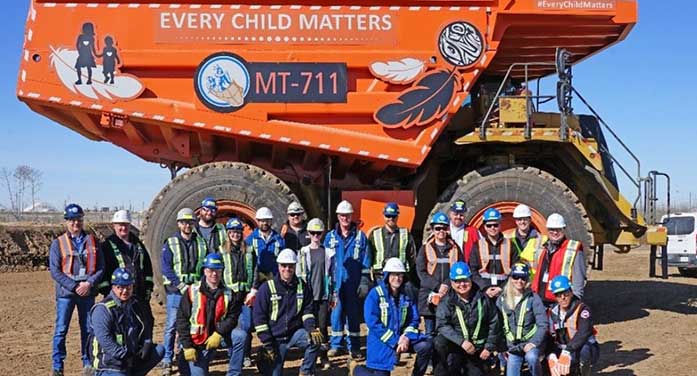 Canadian oil sands producer Imperial Oil says it has signed two of its largest-ever contracts with Indigenous businesses.
Canadian oil sands producer Imperial Oil says it has signed two of its largest-ever contracts with Indigenous businesses.
Two joint ventures – one with the Fort McKay First Nation and another with the Mikisew Cree First Nation – will provide Imperial large-scale earthwork, land reclamation, and mining support services at its Kearl oil sands mine in northern Alberta.
The financial details of the deals were not disclosed, but Imperial said the two businesses will handle about 38 million cubic metres of earth over the next five years.
“Never before at Imperial have contracts of this scale been provided through Indigenous-owned companies,” said Kearl production manager Jamie Long.
Imperial’s new contracts with Fort McKay Graham and Mikisew North American continue a trend of increasing spending with Indigenous businesses in the oil sands.
| RELATED POSTS |
| Energy industry a pipeline to Indigenous prosperity By Mark Milke and Lennie Kaplan |
| Indigenous people ready to do business with oil and gas By Karen Ogen-Toews |
| Showing respect for Indigenous priorities can pay dividends By Beverley O’Neil |
According to the latest data from the Canadian Association of Petroleum Producers, oil sands companies spent a record $2.4 billion with 275 Indigenous businesses in 2019, up from $1.5 billion with 263 Indigenous businesses in 2015.
“Partaking in these economic activities means everything to our communities – from improved education, health care, housing and elder care to overall access to critical infrastructure so these communities can continue flourishing into the future,” Mikisew Group CEO Dan Gallagher said in a statement.
The work also provides employment opportunities and training for the community, he said.
Kearl started operating in 2013 and expanded in 2015. It has the capacity to produce about 240,000 barrels per day using a technology that generates some of the lowest emissions per barrel in the oil sands.
Called paraffinic froth treatment (PFT), the system removes the parts of the oil sands barrel that are most energy intensive to treat prior to major processing, reducing CO2 emissions.
Mined PFT product has the lowest emissions intensity in the oil sands, at 41 kg of CO2 equivalent per barrel in 2020, according to IHS Markit.
The Fort McKay and Mikisew Cree First Nations jointly own a major piece of another PFT mine, Suncor Energy’s Fort Hills project.
The First Nations spent $545 million in 2017 to acquire 49 per cent ownership of the Fort Hills East Tank Farm, one of the largest Indigenous investments in Canadian history. The profits are used for social programs, education and training, developing business capacity and building infrastructure, Mikisew Cree First Nation says.
Fort McKay Group of Companies CEO Sami Saad said the new contracts with Imperial help improve the prospects for Indigenous businesses.
“Establishing ourselves as a competitive provider is paving the way for other Indigenous companies to reach the same achievements,” he said.
Deborah Jaremko is director of content for the Canadian Energy Centre, an Alberta government corporation funded in part by taxes paid by industry on carbon emissions.
Deborah is a Troy Media Thought Leader. For interview requests, click here.
The opinions expressed by our columnists and contributors are theirs alone and do not inherently or expressly reflect the views of our publication.
© Troy Media
Troy Media is an editorial content provider to media outlets and its own hosted community news outlets across Canada.

